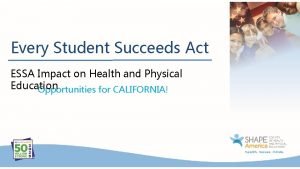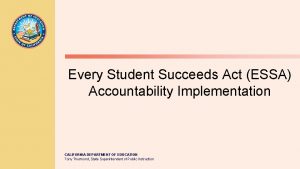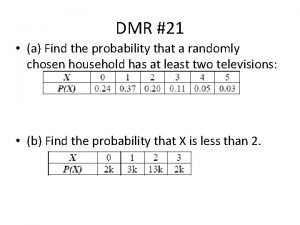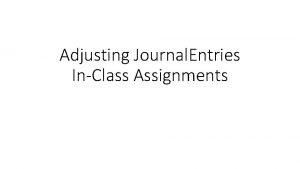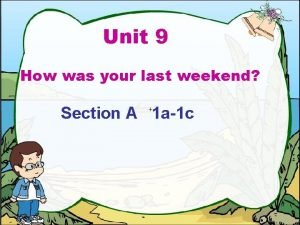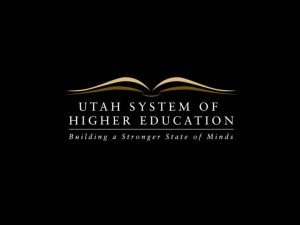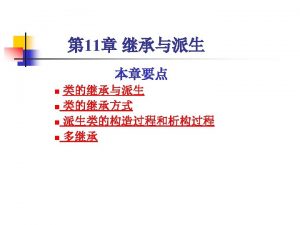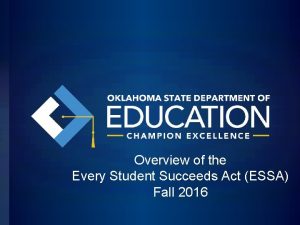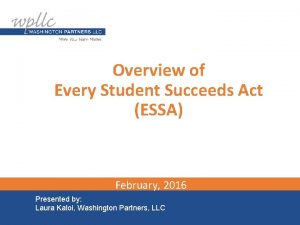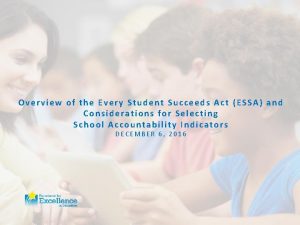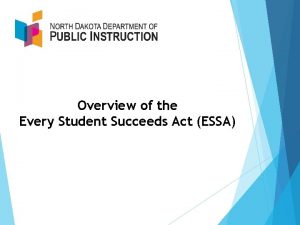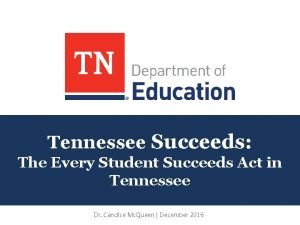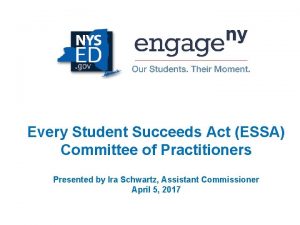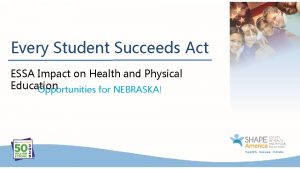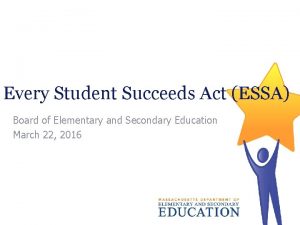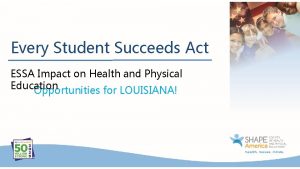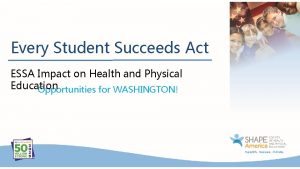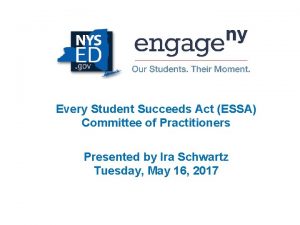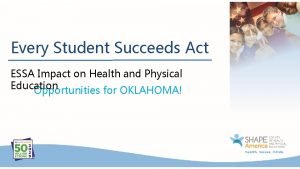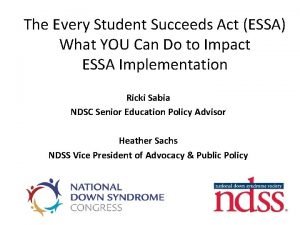Overview of the Every Student Succeeds Act ESSA



















- Slides: 19

Overview of the Every Student Succeeds Act (ESSA) Summer 2016

Background The Elementary and Secondary Education Act (ESEA) was first passed in 1965, emphasizing equal access to education for all children.

ESEA in Oklahoma v. In 2011, our state applied for and received a waiver from provisions of No Child Left Behind. The waiver was focused on three key areas: – College/Career Ready Expectations for All Students – Differentiated Recognition, Accountability, and Support – Supporting Effective Instruction and Leadership Oklahoma will continue much of the work it begun under the waiver under ESSA with additional flexibility for state control.

Every Student Succeeds Act The Every Student Succeeds Act (ESSA) reauthorizes the Elementary and Secondary Education Act to create a longterm, stable federal policy that gives states additional flexibility and encourages innovation, while at the same time holding us accountable for results.

Highlights of ESSA • Maintains annual assessments for grades 3 -8 and high school • Creates the opportunity for states to pilot innovative assessment systems • Increases state flexibility to design accountability systems, interventions and student supports • Gives states flexibility to work with local stakeholders to develop educator evaluation and support systems • Increases state and local flexibility in the use of federal funds

Standards • The Every Student Succeeds Act reinforces state authority over standards, accountability, and other key education policies. • It prohibits any U. S. Secretary of Education from requiring states to adopt specific standards, assessments, teacher evaluation methods, or other key policies. • The law does require that state standards are aligned with college and career skills, but defers to states on how to define such alignment.

Assessments • Each state is required to have implemented a set of high-quality student academic assessments in math, reading or language arts, and science. • Assessment timelines from current law are maintained. • Assessments may, at the state’s discretion, measure individual student growth.

Accountability v Each statewide system must “meaningfully differentiate” schools using: • Academic proficiency on state assessments • Graduation rates for high school • English Language Proficiency • Growth or another statewide academic indicator for K-8 schools • Not less than 1 other state-set indicator of school quality or student success • 95% assessment participation rate

School Improvement States must use evidence-based interventions. Specific school improvement models are no longer required.

School Improvement • Comprehensive Support and Improvement: • Lowest-performing 5% of Title I schools on state accountability index; • High schools with <67% graduation rates, and • Schools with underperforming subgroups that do not improve after a state-determined number of years. • Targeted Support and Improvement: • Schools with consistently underperforming subgroups, as defined by the state.

Teacher and Leader Quality • The Every Student Succeeds Act does not require specific educator evaluation measures or methods. – The law does allow, but does not require, states to use Title II funds to implement teacher evaluations • Title II Part A allows states to fund their priorities in attracting, preparing, supporting and retaining effective teachers and leaders to serve high-poverty, minority students. • The law reauthorizes the Teacher Incentive Fund, a competitive grant to support innovative

Teacher and Leader Quality v ESSA authorizes new allowable federal funding for states to develop and implement: – Teacher and School Leader Academies; – Activities to support principals (new 3% Title II setaside); – Educator training on the use of technology and data privacy; – Reform of state certification, licensure and tenure systems; – Development and implementation of teacher evaluation and support systems; – And other state educator workforce priorities.

Transition Timeline Now Augu st 2016 • Familiarize stakeholders with the new law. • ESEA Flexibility Waiver will expire. SY 16 -17 • Transition period to work with stakeholders and develop state plans. SY 17 -18 • New state plans in compliance with ESSA will go into effect.

Oklahoma’s Initial Transition Plan Oklahoma’s ESSA State Plan will focus on advancing the vision of our Strategic Plan: ØAchieving academic excellence for each student ØBuilding capacity for districts and OSDE ØChampioning a culture of trust and respect statewide

Oklahoma’s Initial Transition Plan v Goal: Designing a collaborative plan that will ensure each student in Oklahoma has access to a high- quality public education that inspires deep learning and leads to success. Key Objectives: • Strengthen early childhood partnerships and measure kindergarten readiness with stateestablished criteria. • Increase by 1, 000 the number of qualified teachers recruited and retained across the state. • Increase the number of high school graduates who earn postsecondary certificates, stackable credentials, industry certification or college credits

Oklahoma’s Initial Transition Plan Key Changes: • New State Assessments aligned to newly adopted Oklahoma Academic Standards • New plan for accountability system to include metrics as required by ESSA • Develop individualized professional development plans for all educators based on evaluations • Extend implementation of Equity plan strategies to include district level equity planning

Oklahoma’s Initial Transition Plan to Engage Stakeholders: • Webpage launched to collect stakeholder feedback and announce upcoming meetings: http: //sde. ok. gov/sde/essa – Sign up for ESSA updates on our webpage • Engage. OK On the Road breakout sessions and community stakeholder lunches • Engage Supt Hofmeister’s network of Advisory Councils • Establish Transition Team of key stakeholders to guide planning and review feedback

Oklahoma’s Initial Transition Plan Key Milestones Date Task July-Aug. 2016 Collect early feedback for drafting October 2016 Draft 1 of Plan posted for review/comment November 2016 Additional opportunities for feedback February 2017 Draft 2 of Plan posted for review/comment May 2017 Governor’s Review July 2017 Submit Plan to USDE

Contact Us http: //sde. ok. gov/sde/essa ESSAfeedback@sde. ok. gov (405) 521 -3301
 Every student succeeds act california
Every student succeeds act california Tony essa
Tony essa Paraules amb s sonora
Paraules amb s sonora Ethnocentric geocentric polycentric regiocentric
Ethnocentric geocentric polycentric regiocentric A professional soccer player succeeds in scoring
A professional soccer player succeeds in scoring Every country and every nation
Every country and every nation Microsoft mission statement
Microsoft mission statement Every knee shall bow every tongue confess
Every knee shall bow every tongue confess Every rotarian every year
Every rotarian every year Every nation and every country
Every nation and every country Every picture has a story and every story has a moment
Every picture has a story and every story has a moment Every child every day
Every child every day Macbeth summary
Macbeth summary Every student deserves a great teacher
Every student deserves a great teacher Qs 3-6 prepaid (deferred) expenses adjustments lo p1
Qs 3-6 prepaid (deferred) expenses adjustments lo p1 Tell me about your last weekend
Tell me about your last weekend What did you do over the weekend
What did you do over the weekend Clearinghouse student tracker
Clearinghouse student tracker Class maths student student1 class student string name
Class maths student student1 class student string name National student clearinghouse student tracker
National student clearinghouse student tracker
